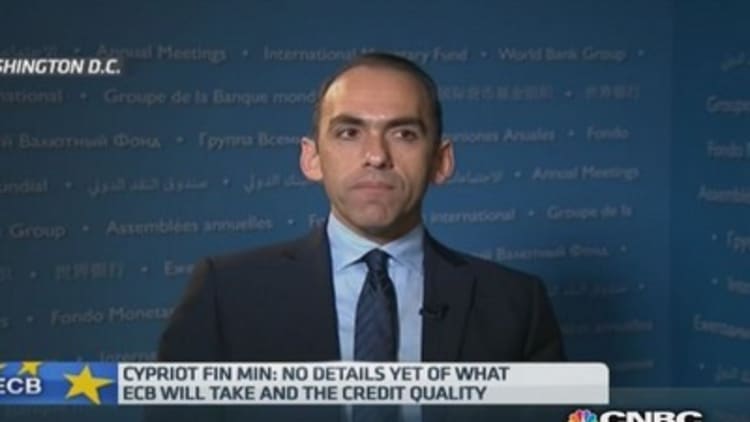
The "extra push" the European Central Bank(ECB)'s plans to buy bonds will give to some of the region's bailed-out economies outweighs fears that it will become a "junk bank," Cyprus' finance minister told CNBC.
Harris Georgiades, finance minister of Cyprus, one of the countries which may benefit from the latest ECB plans, defended the move in an interview with CNBC at the International Monetary Fund (IMF) meeting in Washington DC.
"We have done a very demanding effort. We are doing everything that is necessary. There should be this extra push to get the real economy re-activated again," Georgiades said.
"We are ready to discuss how our banks can best make use of this new instrument."
Cyprus agreed a 13 billion euro ($15.6 billion) "bail-in" of its troubled banking sector with the IMF, ECB and European Commission in 2013. Unlike other euro zone bailouts, shareholders and bondholders bore some of the costs of restructuring.
As part of its efforts to revitalise the euro zone economy, the ECB has already cut interest rates to the lowest they have ever been, but this has not been met with the expected boost to borrowing, or growth. There are now worrying signs of a slide back into recession for the euro zone as even stalwart Germany falters.
On of of this, the ECB risks the "liquidity trap"; a situation described by economist John Maynard Keynes whereby injections of cash into private banks are having no effect on interest rates or monetary policy.
The next step for ECB President Mario Draghi could be the launch of a bond-buying – or quantitative easing – program. However, the process is riddled with problems for the ECB: there are no common euro zone bonds so the bank would have to pick one country over another, plus there is nothing in the bank's founding charter that allows for such an action.
The cost of borrowing for bailed-out countries like Cyprus, Ireland and Portugal has fallen substantially as investors anticipate that the ECB will start buying up bonds to boost liquidity. Yet some, like Adam Myers, European head of currency strategy at Crédit Agricole, are warning of "bubble conditions" as bond yields appear to be out of step with economic realities.
"Draghi doesn't want to create the impression there is a bubble, because that might exacerbate the problem," Myers told CNBC.
- By CNBC's Catherine Boyle





